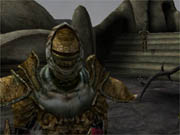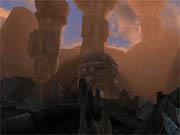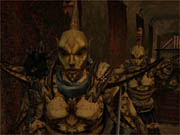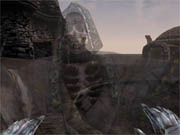If you're familiar with previous Elder Scrolls games, namely Arena and Daggerfall, or if you've heard anything in particular about The Elder Scrolls III: Morrowind over the past several years, then you'll be expecting the game to be as big as it is open-ended. It is, and very much so in both those respects. As its developers promised all along, Morrowind does feature an enormous, detailed 3D world filled with thousands of different characters. It does offer such a large number of optional side quests that it's unlikely you'd ever see them all, even if you tried. And it's true that you could spend close to a hundred hours solving whichever ones you happen upon during the course of spending about as much time finishing the main quest. For all these reasons, and because of its superlative visuals, Morrowind is an undeniably impressive game. It does have shortcomings, and at times they seem to outnumber its strong points, but in general Morrowind's praiseworthy qualities tend to far outweigh its relatively minor problems. That's putting it broadly, because clearly there's a lot to be said about the game.

For the most part, Morrowind carries on many of the proudest traditions of computer role-playing. If you've been playing fantasy role-playing games for a while, then you'll find yourself in familiar territory here, at least figuratively speaking. The actual world of Morrowind is original. The game's main plot, though it's presented mostly in writing, is quite engaging, and it involves first uncovering why your emperor has ordered you to the island province of Morrowind and then fulfilling your destiny there. The characters you'll meet along the way aren't all completely unique, but there's enough difference between them that they help give you a distinct sense of the setting and even the culture of Morrowind. It's a place with a surprising amount of political intrigue and a long history, and that history is described thoroughly in the dozens of different books you can pick up and read in the game. You're on your own through most of Morrowind, which makes you feel adventurous, but sometimes lonely. That's also in part because interacting with characters is a pretty detached process that boils down to clicking through a list of available topics of conversation. You'll also notice how non-player characters in Morrowind generally just stand there, doing nothing. Even when you come visit them in a cornerclub or in their homes, you'll never see them engaging in any activities whatsoever, which makes the world seem less alive than it could have. Some hidden gags provide a refreshing bit of comic relief, but these moments are perhaps too few and far between.
The characters you meet will respond to you differently depending on who you are, and who you are is entirely up to you thanks to the great deal of flexibility you get in creating your own persona. There are more than 20 different character classes to choose from, including choices like barbarian, spellsword, and assassin. You can either pick one of these or, in a nod to the classic Ultima series, you can answer a series of moral questions and the game will choose a class for you based on your decisions. The third option is to create your own class, and that's the best of the three. After all, the premade classes are really just templates rather than truly distinctive character types. They're examples of what can be done with Morrowind's character generation system, in which each character class has five major skills, five secondary skills, and a core specialization: combat, magic, or stealth. Your specialization determines which skills your character will initially be strongest in and can improve in the fastest. There are nearly 30 different skills overall, and even those that don't fall under your major or secondary skills are still available to you, though your character will be slower to hone them.
You could go out of your way to make a purely combat-focused, magic-focused, or stealth-focused character, but in reality you'll probably use skills from all three categories. That's because some of the skills are pretty basic. For instance, the fancily named "acrobatics" only governs your jumping ability and how much damage you absorb from falling. Using various weapons or wearing various types of armor gradually improves your skills in using those types of equipment, and that is also the case with using the various schools of magic. Whenever your character runs, you're using "athletics," which is classified as a combat skill. The walking speed in Morrowind realistically represents a leisurely pace, but unfortunately, it seems terribly slow in game terms, even if you're accustomed to the slow pace of other 3D role-playing games. So you'll learn to run all the time, just as soon as you pick up on Morrowind's simple controls.

The most interesting thing about Morrowind's skill system is that it's tied in with how you gain experience levels. In most role-playing games, you gain experience (and thus improve your abilities) mostly by killing stuff or solving quests. In Morrowind, you gain levels by practicing your character's main skills. Other RPGs tend to cripple non-fighter characters by still forcing them to fight to gain levels. But in Morrowind, if you play as a thief, then you gain levels by thieving. If you play as a magic user, you gain levels by using magic, and so on. This is a clever system that makes perfect sense.
However, it does have some problems, insofar as certain skills are much easier to improve than others. The playing field is leveled somewhat since skill improvement (through training) can simply be bought. Sadly, you might not realize until after many hours of play that some of your character's skills just aren't cutting it. Your options are to suck it up or start over. Some of the skills aren't ineffective so much as they're underdeveloped. Speechcraft, a seemingly sophisticated ability, is simplistic in practice. You have the option to try to flatter, intimidate, taunt, or bribe any of the NPCs in the game. But in reality, these are just thinly veiled dice rolls based on your speechcraft skill rating. If you fail, the other character loses affinity for you, but you can just keep trying until you succeed several times in a row. It's as pointless (and can be as pointlessly addictive) as a virtual slot machine. It's also rather ridiculous, since when you repeatedly try to bribe the same character, he or she will alternate between being insulted by your intentions and gladly accepting your money.
The other issue with the skill system is that it doesn't give you a good sense of character development. You get almost no feeling that any of your skills are actually getting better, even as you build them up over long periods of time. When you gain levels, you can put more points into your core attributes (strength, intelligence, and so on), but even then, it's hard to tell that your character is growing in power. Instead, in Morrowind you get stronger mostly by finding better stuff. Even early on, and sometimes surprisingly so, you can get your hands on some powerful weapons, armor, and artifacts that will last you for many hours' worth of gameplay. Throughout the game, your character will be only as good as his or her items, or his or her magic, which must be bought, rather than discovered or learned from experience. Actually, the game not only allows you to buy spells, but it also allows you to make them. In addition, you can create your own enchanted items and make your own potions from reagents you can actually go scavenging for out in the wilderness. Constantly finding new things is one of the core appeals of role-playing games, and it's certainly one of the more appealing aspects of Morrowind.

Some other aspects of Morrowind aren't as enjoyable. For instance, you could nitpick over the way the game treats the process of disarming trapped treasure chests or doors. Generally an important facet of fantasy role-playing, it's handled clumsily in Morrowind because no matter what kind of character you're playing as, you'll clairvoyantly know if a door or chest is trapped. Then you just use gadgets called probes over and over until you successfully disarm the device. A low skill in "security" means your chances of success are slim, but there's a zero-percent chance of triggering the trap by accident. Locks are dealt with in exactly the same fashion, only using picks instead of probes. Unlike locks, traps are supposed to be dangerous and difficult to detect. As another example, most of Morrowind's shopkeepers have little money on hand. This is interesting the first few times you find yourself having to sell back more than they can afford to buy. But eventually, you'll end up just abandoning a lot of perfectly good loot (some of it worth staggering amounts of money) for lack of a convenient way to sell it off or the ability to carry it in your overcrowded inventory. Too bad there's no auction block in Morrowind.
Morrowind does let you do whatever you want. If you do decide to vent your frustrations over these types of things on the game's townspeople, you may find it odd that they will stare at you unflinchingly as you hoist your weapon high overhead, ready to strike. You'll also find it odd that the entire world seems to learn of your crimes at the very instant they're committed. You'll sometimes be branded as an outlaw even if you commit a crime in seeming secrecy. At any rate, the sheer size and scope of Morrowind is an open invitation for these and other, similar complaints. Yet to nitpick too much over Morrowind's smaller shortcomings would be to fail to see the forest for the trees. The aggregate experience that the game provides is in fact more than the sum of its parts. Actually, it's such a big game that you can pretty much ignore most any of its elements that you don't happen to like.

Most, but not all. Avoiding combat in Morrowind can be difficult and at times impossible. And the combat itself leaves a lot to be desired. It's purely a hack-and-slash affair against enemies that mostly just rush right at you, and while you can execute three different types of attacks with your melee weapons, that's about the only positive way to describe the combat. Considering that the game tells you outright when a chest is trapped or when you've succeeded at persuading someone, it's surprising that Morrowind provides so little information about what's happening in a fight. From the spurt of blood and the loud, almost comical "thwack" sound you'll hear, you'll know that you did in fact hit the opponent. But you won't know to what extent you hurt it. You won't know if your two-handed sword did one point of damage or 60, and you won't know whether you've merely grazed the opponent or whether you've delivered it to death's door. If the intent was to make combat realistic, the designers should have at least shown visible damage on the enemy characters, as in last year's outstanding Wizardry 8.
The other significant problem with Morrowind is the way it keeps track of your quests. Namely, it compiles references to all the quests you've taken on or completed, as well as any other important bits of information you come across, into a journal. This journal will become hundreds of pages long as you play. While you can bring up an alphabetical list of topics to look up specific ones, you'll nevertheless need to know what exactly it is you're trying to find. There's no way to just browse through the quests you have pending, an option that would have been really handy. But you'll still be referring to your journal constantly. It simply could have done a much better job of helping you keep track of the dizzying array of quests, places, and characters you'll encounter. The journal could be prove to be a crippling problem for more casual players, who might take a break from Morrowind for a few days, only to return to find that they've completely forgotten whatever it was they were supposed to be doing.
With all that said, it's necessary to reiterate that the experience of playing Morrowind is certainly rewarding, mostly because of all the questing you'll do. Despite the length and size of Morrowind, it does a fine job of constantly giving you new objectives. Many of its quests are quick and dirty, which makes the gameplay engaging and addictive--steal this, kill him, save her, find that. That's not to say all the quests have only a single step, because some of them are quite complex, especially later on. You might have to spy on certain characters and find out what they're up to and then report back. You might have to infiltrate heavily guarded compounds and discover secret political agendas. You might have to complete a series of legendary trials. You're given clear-cut goals every step of the way. Of further note, there are more than 10 different factions you can join if you want, ranging from a fighter's guild to a sanctioned assassin organization to a religious cult. Most of these will initially extend membership to you, and you aren't really limited in terms of how many you can sign with. You can enlist in the fighter's guild, the mage's guild, and the thieves' guild one and all if you like. But as you take on increasingly important assignments, which tend to grant you suitable rewards and higher ranking within the organization, you may have to choose your allegiances once and for all. Also, there's never a time limit on quests, for better or worse. So if one requires you to go to some far-off place, you can ignore it for a while (just try not to forget it) until you have other reasons to head out that way. For good measure, Morrowind's numerous dungeon crawls, though they tend to be pretty brief, are suitably suspenseful and exciting.

Simply exploring Morrowind is possibly the best thing about it. The game looks stunning, though you'll need a fast system and a good video card to fully appreciate the graphics. Morrowind doesn't look perfect, since the character animations are awkward and some of the character models look coarse. But most of them look fabulous and feature fully articulated faces and highly detailed clothing and armor. However, the environments themselves are what steal the show. Extremely impressive effects, ranging from torrential rains and raging sandstorms to bodies of water that look so real they'll make you thirsty, all help make the world seem alive. Soft ambient lighting and atmospheric hazing is also put to excellent use. You'll always look forward to seeing the next of Morrowind's numerous, imaginative, beautiful areas. You'll feel adventurous just jogging from place to place, though you'll want to take advantage of the game's various modes of fast transportation whenever possible. These are really convenient, though it's too bad that all you see when you do something like ride a ship or hop aboard a giant flealike siltstrider is a completely black loading screen. Moments later you magically appear in the new location. As a consolation, Morrowind's loading times are generally short, such as when the game pauses abruptly but briefly to bring in new scenery as you're traveling by foot.
Morrowind raises the bar on what can and should be expected of a computer role-playing game's graphics, but you couldn't say that about its sound. The very first time you boot up Morrowind, you'll be treated to a memorable, stirring theme filled with soaring strings and booming percussion. You'll proceed to hear it literally every five minutes or so during play. How such a short soundtrack can befit a game as big as Morrowind is anyone's guess, though Morrowind's voice work is much more varied. Characters will initially greet you (or brush you off) in full speech, and some of these sound bites, especially from the gravelly voiced dark elves, are terrific. The game also sports some decent ambient effects, though the rest of the sounds are generic.
Many of the biggest role-playing games from over the years have shipped with a number of bugs, and Morrowind is no exception. Luckily for everyone, its bugs are trifling when compared with those in the retail release of Morrowind's notoriously buggy predecessor, Daggerfall. But some of the bugs are definitely frustrating. When a game such as this encourages you to just go out into the world and do whatever you feel like, imagine your disappointment when, after going out of your way and off the beaten path to defeat a particularly powerful opponent, the game unceremoniously dumps you back to Windows. We had this happen on several different occasions, and we also discovered some other glitches with some of the quests, such as one that allowed us to make an infinite amount of money.

As if the 200-odd hours' worth of gameplay included in Morrowind weren't enough, the game ships with an editor that you can use to create quests, places, people, and stuff that can be plugged into the core game. This construction set isn't a full-blown mod-making utility, but it's still quite powerful. Morrowind already has a huge fan base, and you can be sure that it will generate great additions to the game that you can download and enjoy for yourself. Bethesda also plans to release some of its own plug-ins for Morrowind, all to help give this single-player product the sort of longevity more often associated with popular multiplayer games.
To be sure, Morrowind offers some of best value for the money of any single-player game currently available, and it ranks up there in terms of size, scope, and quality with some of the best games the role-playing genre has ever had to offer. Morrowind does have numerous drawbacks, as well as some bugs. But they're all generally minor enough that most anyone should be able to look past them, especially if they're aware of them going into the game. They'll otherwise find that Morrowind fulfills its many ambitious intentions. It's a beautiful-looking, sprawling, and completely open-ended game that allows you to play pretty much however you like as long as you're willing to fill in a few blanks using your imagination. If that's that case, then you could easily spend a couple of hundred hours over the course of days, weeks, or months losing yourself, deliberately or not, in Morrowind's carefully detailed world. And if you're hard-core into computer role-playing games, then that's about the highest recommendation you could hope for.